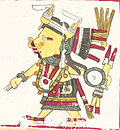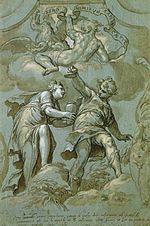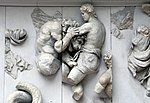Greek mythology associates the name Palaestra (Παλαίστρα) with two separate characters, both associated with the god Hermes: one became a mortal lover...
5 KB (736 words) - 19:38, 2 August 2023
Titans (redirect from Titans (mythology))
In Greek mythology, the Titans (Ancient Greek: οἱ Τῑτᾶνες, hoi Tītânes, singular: ὁ Τῑτᾱ́ν, -ήν, ho Tītân) were the pre-Olympian gods. According to the...
85 KB (9,264 words) - 16:59, 17 June 2024
(1999). Classical Mythology. Oxford University Press. pp. 133–134. ISBN 0195143388. Grimal, Pierre, The Dictionary of Classical Mythology, Wiley-Blackwell...
2 KB (193 words) - 17:44, 3 April 2024
LGBT themes in mythology occur in mythologies and religious narratives that include stories of romantic affection or sexuality between figures of the same...
102 KB (12,084 words) - 03:59, 7 July 2024
In Greek mythology, Echidna (/ɪˈkɪdnə/; Greek: Ἔχιδνα, translit. Ékhidna, lit. "she-viper", pronounced [ékʰidna]) was a monster, half-woman and half-snake...
64 KB (6,010 words) - 07:46, 23 June 2024
In Greek mythology, Kratos, also known as Cratus or Cratos, is the divine personification of strength. He is the son of Pallas and Styx. Kratos and his...
27 KB (2,741 words) - 16:52, 4 July 2024
Pompeii (redirect from Large Palaestra)
from about 30 BC. New public buildings included the Amphitheatre with palaestra or gymnasium with a central natatorium (cella natatoria) or swimming pool...
95 KB (10,690 words) - 17:44, 3 July 2024
Pasiphaë (redirect from Pasiphaë (Greek mythology))
In ancient Greek religion and Greek mythology, Pasiphaë (/pəˈsɪfiiː/; Greek: Πασιφάη, translit. Pasipháē derived from πάσι (archaic dative plural) "for...
31 KB (3,099 words) - 17:44, 4 May 2024
In Greek mythology, Hybris (/ˈhaɪbrɪs/; Ancient Greek: Ὕβρις, lit. 'wanton violence', 'insolence') was the personification of insolence. According to...
2 KB (166 words) - 23:09, 29 February 2024
personification/daemon of rot, decay and putrefaction, in Greco-Roman mythology. Theoi Project: Phthisis/Tabes Theoi Project: Goddess(es) or Spirit(s)...
880 bytes (53 words) - 12:26, 31 December 2023
In ancient Greek religion and mythology, Iris (/ˈaɪrɪs/; EYE-riss; Greek: Ἶρις, translit. Îris, lit. "rainbow," Ancient Greek: [îːris]) is a daughter...
32 KB (3,179 words) - 20:46, 6 June 2024
In Greek mythology, Ate, Até or Aite (/ˈeɪtiː/; Ancient Greek: Ἄτη) was the goddess of mischief, delusion, ruin, and blind folly, rash action and reckless...
12 KB (1,248 words) - 22:23, 10 February 2024
Pleione (Ancient Greek: Πληιόνη or Πλειόνη) was an Oceanid nymph in Greek mythology and mother of the Pleiades. Pleione presided over the multiplication of...
4 KB (365 words) - 06:26, 13 May 2024
In Greek mythology, Nerites (Greek: Νηρίτης, romanized: Nērítēs) was a minor sea deity, the son of "Old Man of the Sea" Nereus and the Oceanid Doris and...
6 KB (532 words) - 13:32, 30 May 2024
Epimetheus (redirect from Epimetheos (mythology))
In Greek mythology, Epimetheus (/ɛpɪˈmiːθiəs/; Greek: Ἐπιμηθεύς, lit. "afterthought") is the twin brother of Prometheus, the pair serving "as representatives...
11 KB (754 words) - 17:32, 31 May 2024
In Greek mythology, Aether, Æther, Aither, or Ether (/ˈiːθər/; Ancient Greek: Αἰθήρ (Brightness) pronounced [ai̯tʰɛ̌ːr]) is the personification of the...
31 KB (3,284 words) - 20:33, 4 July 2024
In Greek mythology, Gelos (/ˈɡɛloʊs, -ɒs/; Ancient Greek: Γέλως) was the divine personification of laughter. According to Philostratus the Elder, he was...
2 KB (199 words) - 11:17, 1 February 2024
In Greek mythology, Algea (Ancient Greek: Ἄλγεα, lit. 'pain, grief') is used by Hesiod in the plural as the personification of pain, both physical and...
4 KB (322 words) - 22:47, 5 May 2024
Helios (redirect from Phlegon (mythology))
In ancient Greek religion and mythology, Helios (/ˈhiːliəs, -ɒs/; Ancient Greek: Ἥλιος pronounced [hɛ̌ːlios], lit. 'Sun'; Homeric Greek: Ἠέλιος) is the...
307 KB (33,994 words) - 20:13, 6 July 2024
In Greek mythology, Elpis (Ancient Greek: ἐλπίς) is the spirit of hope. She was depicted as a young woman, usually carrying flowers or a cornucopia in...
6 KB (712 words) - 10:52, 26 November 2023
In Greek mythology, Echo (/ˈɛkoʊ/; Greek: Ἠχώ, Ēkhō, "echo", from ἦχος (ēchos), "sound") was an Oread who resided on Mount Cithaeron. Zeus loved consorting...
15 KB (1,996 words) - 16:05, 23 May 2024
Nyx (redirect from Nox (mythology))
In Greek mythology, Nyx (/nɪks/ NIX; Ancient Greek: Νύξ Nýx, [nýks], "Night") is the goddess and personification of the night. In Hesiod's Theogony, she...
100 KB (10,971 words) - 20:47, 10 July 2024
In Greek mythology, Soteria (Greek: Σωτηρία) was the goddess or spirit (daimon) of safety and salvation, deliverance, and preservation from harm (not...
5 KB (514 words) - 22:54, 18 December 2023
contained a courtyard, or palaestra, which was an open-air garden used for exercise. In some cases, the builders made the palaestra an interior courtyard...
18 KB (2,253 words) - 23:28, 23 June 2024
In Greco-Roman mythology, Leuce, also spelled Leuke (Ancient Greek: Λεύκη, "white", specifically "white poplar"), was a nymph and a daughter of the Titan...
7 KB (922 words) - 14:03, 25 November 2023
Hermes (redirect from Hermes (Greek religion and mythology))
(/ˈhɜːrmiːz/; Greek: Ἑρμῆς) is an Olympian deity in ancient Greek religion and mythology considered the herald of the gods. He is also widely considered the protector...
109 KB (10,697 words) - 12:34, 9 July 2024
Nilus /ˈnaɪləs/ or Neilos (Ancient Greek: Νεῖλος), in Greek mythology, was one of the Potamoi who represent the god of the Nile river itself. Nilus was...
8 KB (653 words) - 07:45, 18 June 2024
Hermaphroditus (redirect from Hermaphrodite (mythology))
In Greek mythology, Hermaphroditus (/hərˌmæfrəˈdaɪtəs/ ; Ancient Greek: Ἑρμαφρόδιτος, romanized: Hermaphróditos, [hermapʰróditos]) was a child of Aphrodite...
23 KB (2,479 words) - 16:28, 26 June 2024
In Greek mythology, Eurybia (/jʊəˈrɪbiə/; Ancient Greek: Εὐρυβία, Εὐρυβίη, meaning "wide-force"), described as "[having] a heart of flint within her"...
3 KB (162 words) - 08:23, 24 June 2023


















